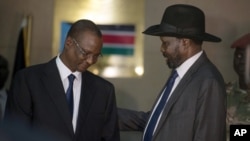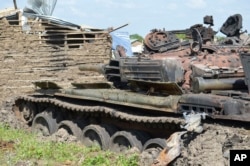South Sudan’s President Salva Kiir has sworn in a new deputy to replace opposition leader Riek Machar, who went into hiding this month after deadly clashes between his forces and government soldiers.
South Sudan’s new first vice president is Machar’s former peace negotiator, General Taban Deng Gai, who also replaced Machar as head of the opposition party last week.
In his acceptance speech Tuesday, Deng said he will focus on three priorities: ending South Sudan’s conflict, ensuring internally displaced people (IDP) can return home, and merging government and opposition armies into one.
In an exclusive interview with VOA’s South Sudan In Focus program, Deng said South Sudan’s government of national unity must be “the government for everybody.”
IDPs must feel confident that the police “in Juba, or Wau or Malakal or Bentiu is their police, that the army which is protecting the nation is for them,” he said. Deng says these forces liberated South Sudan, and it should not be difficult for them to provide services and make the people secure.
“How do we do it? We are going to move forward as one government. We are one government, we have one president, we are one nation, and it is our people that need services and protection,” Deng told South Sudan In Focus managing editor John Tanza.
South Sudan has been ripped apart by political and ethnic violence since fighting erupted between pro-Kiir and pro-Machar army factions in December 2013. Tens of thousands of people have died and more than two million have been displaced from their homes, many to neighboring countries.
A peace deal between the government and opposition signed last August led to creation of a transitional government with Machar as first vice president. But the agreement was severely tested this month by several days of fighting in Juba that killed at least 300 people.
Machar has not been seen in public since attending a news conference at the presidential palace on July 8.
Ahead of Tuesday’s ceremony, officials in the opposition, known as the SPLM-In Opposition, gave conflicting signals on whether they will accept Machar’s ouster and replacement.
Ezekiel Lol Gatkuoth, the former opposition secretary for foreign affairs, said Deng has the support of the entire SPLM-In Opposition.
“He has been the chief negotiator. He was the one who negotiated this agreement in Addis Ababa. He is a general in the army. He also participated in the war of liberation since 1983. So he has the support of the army and also the support of the party, and he has a lot of support from South Sudanese,” he said.
But Goi Jooyul Yol, SPLM-In Opposition representative to Ethiopia and the African Union, said Deng does not represent the entire former rebel movement.
“Taban Deng Gai and Ezekiel Lol and two others went ahead and installed Taban Deng Gai to be the chairman of SPLM-IO. … We have 28 members of the politico bureau of the central committee of SPLM-IO. Only four are out of Juba. How would four people decide on the leadership of an organization?” Goi Yol said.
Gatkuoth denied Kiir and other members of the SPLM-IO plotted to assassinate Riek Machar during fighting that broke out in early July in Juba. In fact, Gatkuoth said it was Kiir who saved Machar and other opposition leaders.
“Let me be categorically clear to you. There was no plan or conniving of anybody against anybody to kill anybody. I know how it started, but let me tell you, if it were not President Kiir Mayardit protecting us in J-1 or the presidential palace, I would not talk to you today. He protected me as Ezekiel Lol Gatkuoth; he protected First President Dr. Riek Machar, he protected Vice President James Wani Igga who was also there,” Gatkuoth said.
Gatkuoth was formerly a bitter critic of Kiir, referring to the president on many occasions as a dictator. But now he said he’s happy to work with Kiir since the president signed the 2015 peace agreement.
“After the agreement was signed we have reconciled. Yes, I’ve been saying words that are harsh to him and that are harsh to others, and I have been expressing my views. After we have agreed to work together in one government - that has made me to say he has opened a new page and I must work with him.
“And that is when I have decided to also say you are not a dictator anymore. You’re cooperating with us; you’re working with us; you are implementing the agreement with us. Let us work to implement this agreement,” Gatkuoth said.
James Butty and John Tanza contributed to this report.






